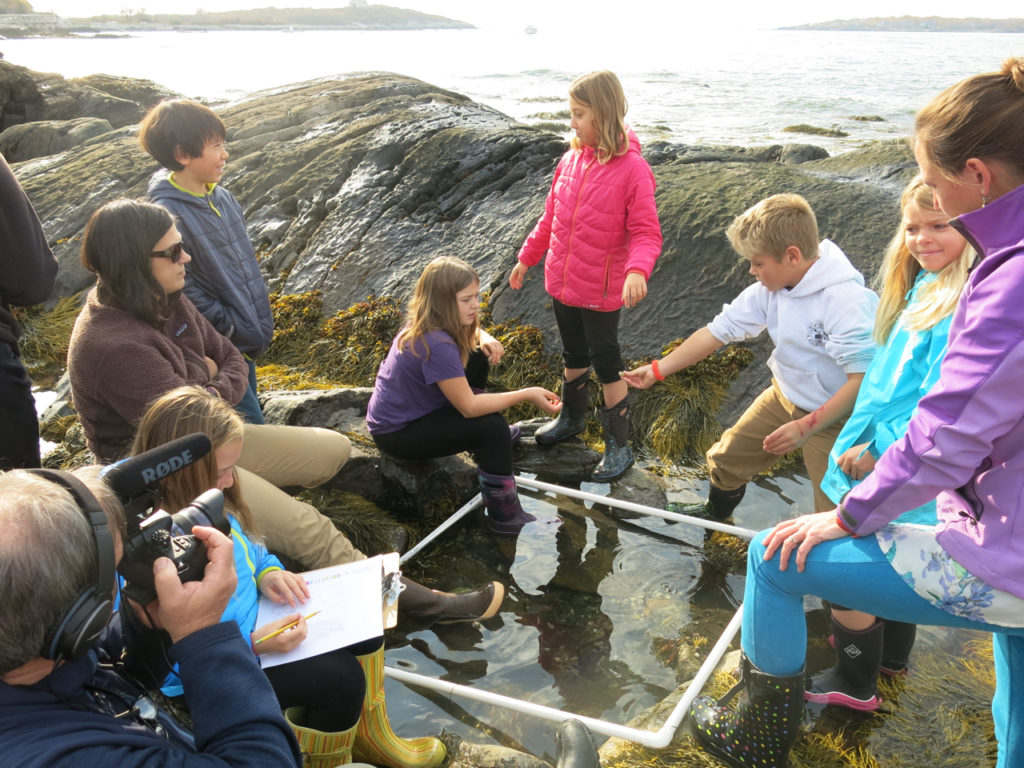Rebecca Clark Uchenna is the Island Institute’s marine associate.
How does a healthy ocean contribute to a healthy sustainable community? How are sustainable businesses developed and what are the benefits? Why is it important to plan for the future? These are all questions middle school students are exploring at Edna Drinkwater School in Northport and Long Island School in Casco Bay.
I teamed up with Green Fire Productions, a nonprofit video production company from Oregon, to film classroom footage of John Van Dis of Edna Drinkwater School and Marci Train of Long Island School for the newest Ocean Frontiers documentary. Ocean Frontiers III is the third film in Green Fire Productions’ Ocean Frontiers film series on ocean planning (http://ocean-frontiers.org). Later this year, the National Ocean Council will release the first U.S. ocean plans for the Northeast and Mid-Atlantic regions. Ocean Frontiers III tells the story of the two ocean plans, focusing on how the ocean plans aim to help us make better decisions for a healthy ocean and thriving coastal communities. The purpose of the film is to build awareness and support for implementing these new ocean plans.
Our first film stop was at Mr. Van Dis’s classroom. His sixth and seventh grade class is focused on kelp aquaculture as a sustainable business practice. They recently set sugar kelp lines with Hurricane Island Foundation in hopes that by next spring they will have a harvestable crop. Students are currently developing a marketable kelp product they plan to sell at local farmers’ markets later next year.

Edna Drinkwater students working together to create a dried kelp seasoning recipe.

John Van Dis of Enda Drinkwater School, being interviewed for Ocean Frontiers III.
How does this tie in with ocean planning? Students explored several data layers from the Northeast Ocean Data Portal to see different ocean uses in their area and were surprised at how much recreational boater and tanker traffic there was. Students realized it is important to think about how others use the ocean and to consider how their kelp aquaculture project fits in with everything else that’s happening on the water. One student summed up the importance of this work and wished that “every student could learn this stuff”.

Data layer from the Northeast Ocean Data Portal used for classroom discussions in John’s class
The following day we headed out to Long Island to visit Mrs. Train’s classroom. We made several stops along the way at various islands which really helped make the point that a healthy accessible ocean is vital to island community health: high school students heading to school on the mainland at the ferry terminal, workers getting on and off the ferry at various islands, fishermen hauling traps, mail and school lunch deliveries via ferry, and people enjoying a beautiful morning on the water.

Diamond Cove, Casco Bay, Maine
Mrs. Train’s fourth and fifth grade class on Long Island in Casco Bay is also focusing on kelp aquaculture. Last year’s class successfully harvested their first sugar kelp crop. This year’s class hopes to continue that work and grow even more kelp. Right now, students are learning about water quality and the importance of having access to clean water. Students are using real scientific equipment to take water samples on one of the island’s beaches and are collecting real data that will hopefully be used in future aquaculture siting on the island. Currently, there is a lack of water quality data for Long Island and Marci’s class is hoping to help fill that data gap. Students are also sharpening their observation skills by studying tide pools at their water sampling site. They are wondering if there is a connection between water quality and biodiversity.


Marci Train, of Long Island, being interviewed at her fourth and fifth graders’ water sampling site
To me, this is what ocean planning is all about; working together to create new solutions that haven’t been thought of before, thinking outside the box, and planning ahead for a healthy, safe, sustainable future. It does not start and stop at the federal and state levels; everyone must come to the table and work collaboratively if these ocean plans are to be successfully implemented. These plans are not political, rather they are a common-sense approach to planning for the future, something these young students understand.
I am truly inspired by what both classrooms are accomplishing. In a world that is clouded with uncertainly (and even fear) I have absolute hope that this next generation of thinkers and doers will be able to handle tough issues head-on in a collaborative and compassionate manner. These students are already tackling tough questions that even state governments and federal agencies are struggling with. They are working together, learning from each other, with very little direct “teaching” from their teachers. Through teamwork, communication, and guidance from teachers, parents and community members, these students are developing real solutions to real-world issues.

The next generation: fourth and fifth graders and their teachers of Long Island School


